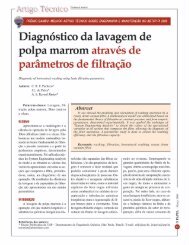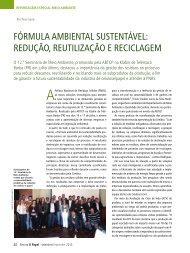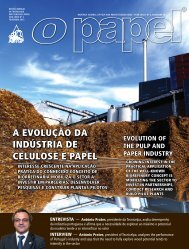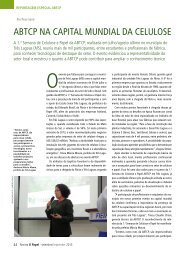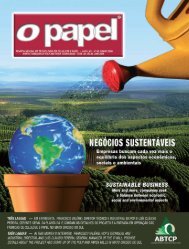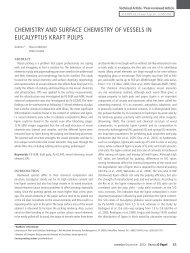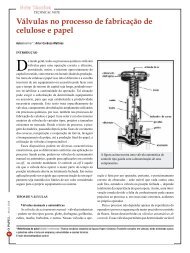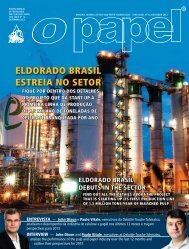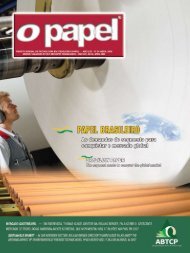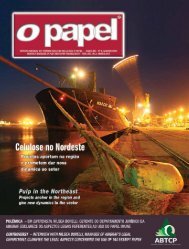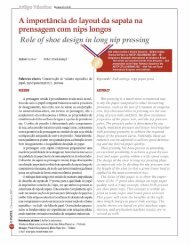Conhecimento é poder. - Revista O Papel
Conhecimento é poder. - Revista O Papel
Conhecimento é poder. - Revista O Papel
Create successful ePaper yourself
Turn your PDF publications into a flip-book with our unique Google optimized e-Paper software.
point out that environmental and environmental<br />
quality management is a shared responsibility<br />
between government, corporations and citizens.<br />
We are entering a phase in which companies strengthen<br />
corporate areas that invest in social responsibility<br />
and sustainability. Today, sustainability and<br />
greenhouse gas inventory reports are becoming a<br />
routine practice in many business segments, as are<br />
proactive actions that contribute to the environment.<br />
The State Policy on Climate Change (PEMC)<br />
is still being structured and the outlooks are very<br />
optimistic in terms of adding business sectors in the<br />
challenge of managing GHG in the State of São Paulo.<br />
A lot is yet to be done in this sense.<br />
O <strong>Papel</strong> – In what way can the Inventory results<br />
contribute to the mitigation goals being pursued by<br />
São Paulo<br />
Covas – The inventory report published maps the<br />
state’s profile of emissions, showing the contribution<br />
of each economic sector in terms of GHG emissions<br />
over the 1990 and 2008 period. This information is<br />
crucial in preparing future scenarios on the emissions<br />
behavior of these sectors. The state’s emissions scenario<br />
through 2020 will serve as the basis for defining<br />
industry goals in our state, including, for example, the<br />
capacity to reduce GHG in industrial processes already<br />
installed, expansion trends of emissions for each sector<br />
in the economy, investment costs, the potential of<br />
voluntary actions, as well as the government’s action<br />
potential in sectors under its direct responsibility.<br />
O <strong>Papel</strong> – The substitution of fossil fuels for biomass<br />
is another possibility currently available to the<br />
pulp and paper industry. However, government incentives<br />
would be necessary to substitute the technology,<br />
particularly for small companies with outdated processes.<br />
Does the Department of Environment (SMA)<br />
intend to delve into the characteristic details of each<br />
industry segment to seek the best alternatives for the<br />
environment<br />
Covas – The pursuit of sustainable alternatives<br />
in the industrial sector is a constant practice of the<br />
SMA. There already exist facilitated financing mechanisms<br />
for companies with projects that translate<br />
into environmental gains, as is the case with<br />
Economia Verde (Green Economy) being offered by<br />
Nossa Caixa de Desenvolvimento. The initiative is<br />
an innovative measure by the government of São<br />
Paulo to facilitate the action of companies that need<br />
access to funds in order to improve their productive<br />
processes.<br />
Another possibility are the Clean Development<br />
Mechanisms (CDMs), a Kyoto Protocol Flexibilization<br />
instrument for complying with GHG reduction<br />
goals in developed nations, which allows for the<br />
inflow of funds to developing countries (upon presentation<br />
and approval of CDM projects, known as<br />
carbon credits). CDM has been an important ally in<br />
internalizing policies for substituting fossil fuels for<br />
biomass. This is an opportune moment for quick actions<br />
to access international resources. Companies<br />
that are in conformity with the country and state’s<br />
environmental legislation have a wide variety of facilities<br />
for tapping them.<br />
O <strong>Papel</strong> – What are the goals and how does the<br />
State of São Paulo intend to achieve them<br />
Covas – The State Policy on Climate Change (PEMC)<br />
defines how the process for proposing goals will be for<br />
the State of São Paulo, through Decree #55,947/2010,<br />
which establishes responsibilities for the Policy on<br />
Climate Change’s Management Committee, Climate<br />
Change Council and Department of Environment.<br />
Without a doubt, they will be a set of decisions<br />
that involve a huge responsibility, due to the potential<br />
economic and social repercussions, and cannot<br />
be made unilaterally by one segment in the government.<br />
To define goals for the sector, you need a<br />
broad based debate process that includes the main<br />
sectors of the state’s economy. It should ultimately<br />
be the result of a comprehensive process with decisions<br />
being made as a consensus, with legitimacy<br />
and the possibility of being implemented.<br />
O <strong>Papel</strong> – Could proof that companies adopt actions<br />
and methods to reduce emissions be a way<br />
to facilitate the process of obtaining environmental<br />
permits Are there any changes expected along<br />
these lines<br />
Covas – In a certain way, the adoption of less polluting<br />
processes and measures that reduce emissions<br />
already facilitate the attainment of environmental licenses.<br />
In specific regards to GHG emissions, it is still<br />
early to say what changes may be made in light of the<br />
commitments and goals being assumed. •<br />
“There already<br />
exist facilitated<br />
financing<br />
mechanisms for<br />
companies with<br />
projects that<br />
translate into<br />
environmental<br />
gains”<br />
junho/june 2011- <strong>Revista</strong> O <strong>Papel</strong><br />
59



